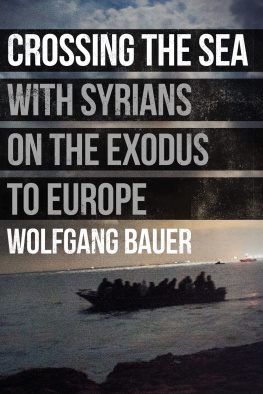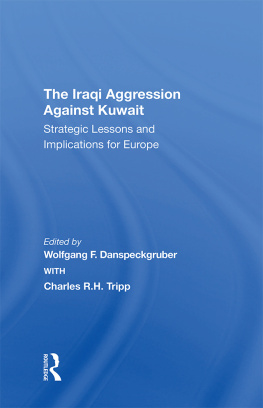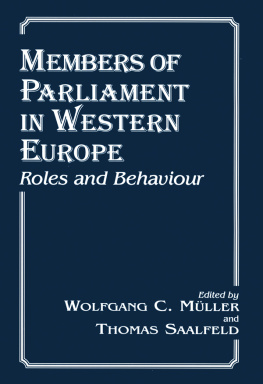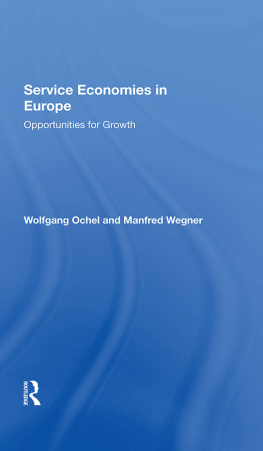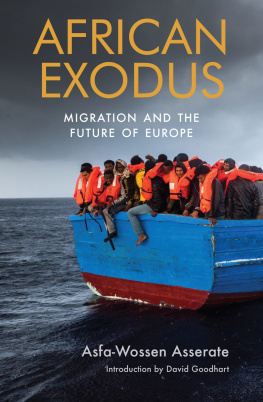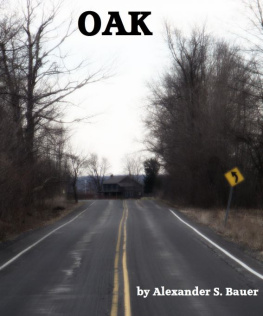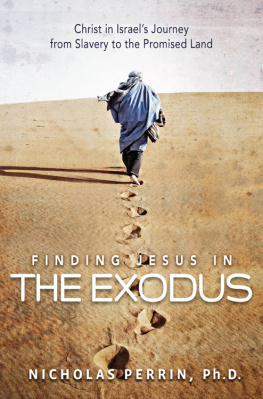Bauer Wolfgang - Crossing the sea with Syrians on the exodus to Europe
Here you can read online Bauer Wolfgang - Crossing the sea with Syrians on the exodus to Europe full text of the book (entire story) in english for free. Download pdf and epub, get meaning, cover and reviews about this ebook. City: Los Angeles, year: 2016, publisher: And Other Stories Publishing, genre: Detective and thriller. Description of the work, (preface) as well as reviews are available. Best literature library LitArk.com created for fans of good reading and offers a wide selection of genres:
Romance novel
Science fiction
Adventure
Detective
Science
History
Home and family
Prose
Art
Politics
Computer
Non-fiction
Religion
Business
Children
Humor
Choose a favorite category and find really read worthwhile books. Enjoy immersion in the world of imagination, feel the emotions of the characters or learn something new for yourself, make an fascinating discovery.
- Book:Crossing the sea with Syrians on the exodus to Europe
- Author:
- Publisher:And Other Stories Publishing
- Genre:
- Year:2016
- City:Los Angeles
- Rating:4 / 5
- Favourites:Add to favourites
- Your mark:
- 80
- 1
- 2
- 3
- 4
- 5
Crossing the sea with Syrians on the exodus to Europe: summary, description and annotation
We offer to read an annotation, description, summary or preface (depends on what the author of the book "Crossing the sea with Syrians on the exodus to Europe" wrote himself). If you haven't found the necessary information about the book — write in the comments, we will try to find it.
Crossing the sea with Syrians on the exodus to Europe — read online for free the complete book (whole text) full work
Below is the text of the book, divided by pages. System saving the place of the last page read, allows you to conveniently read the book "Crossing the sea with Syrians on the exodus to Europe" online for free, without having to search again every time where you left off. Put a bookmark, and you can go to the page where you finished reading at any time.
Font size:
Interval:
Bookmark:



First published in English by And Other Stories, 2016
High Wycombe, England Los Angeles, USA
www.andotherstories.org
Suhrkamp Verlag Berlin 2014
All rights reserved by and controlled through Suhrkamp Verlag Berlin.
This English edition has been updated by the author and photographer with new material.
English language translation copyright Sarah Pybus 2016
Photography Stanislav Krupa
All rights reserved. No part of this publication may be reproduced or transmitted in any form without the prior written permission of the publisher.
ISBN 9781908276827
eBook ISBN 9781908276834
A catalogue record for this book is available from the British Library.
Editor: Stefan Tobler; Typesetting & eBook: Tetragon, London ; Cover Design: Edward Bettison.
And Other Stories is supported by public funding from Arts Council England.
The translation of this work was supported by a grant from the Goethe-Institut, which is funded by the German Ministry of Foreign Affairs.

Run! The high voice of a young man, a child still really, yells behind me. Run! I start to run without fully understanding whats going on; without seeing much in the dusk, we run single-file down the narrow path. I run as fast as I can, watching my feet land now on dirt and now on rock. I jump over holes in the ground, over chunks of wall, stumble and keep going. You sons of bitches! The shout comes from one of the boys who have just driven us out of the minibuses and now run alongside us, whacking us like cattle hands driving their herds. He beats us with a stick, hitting our backs and legs. He grabs my arm, cursing as he pulls me forwards. There are fifty-nine of us men, women and children, whole families with rucksacks on our backs and cases in our hands, running down a long factory wall somewhere on the edge of an industrial zone in Alexandria, Egypt.
In front of me, Hussans back rises and falls. A bulky twenty-year-old, eyes to the ground, wheezes, soon begins to stagger, blocks my way because he cant go on, stops suddenly, so I push him on from behind, I push with all my strength until he starts running again. Blows rain down on us. Somewhere in front of Hussan, thirteen-year-old Bissan cries with fear. As she runs, she clings to the rucksack containing her diabetes medication. Scum! shouts the man driving us forwards. Behind me, fifty-year-old Amar wears the highly visible, signal-blue Gore-Tex jacket he bought specially for this day; his daughter thought the colour was stylish. He too gets slower and slower; his knee hurts, his back too, but as he said earlier, hes going to make it. He has to make it. Like almost everyone here, he comes from Syria. For him, Egypt is just one stop on his journey. Then the wall turns sharply to the left and suddenly, not even fifty metres away, we see what we have been anticipating and fearing for days. The sea. Glistening before us in the last of the evening light.
In April 2014, photographer Stanislav Krupa and I joined a group of Syrian refugees trying to get across the sea from Egypt to Italy. We put ourselves in the hands of people smugglers who have no idea that we are journalists. Thats why we get herded forward with sticks like the rest; we all need to move quickly so our large group doesnt attract attention. They would never take journalists along for fear of being betrayed to the security services. This is the most dangerous aspect of our journey: being unmasked by the smugglers. Only Amar and his family know who we really are. He is an old friend from my time reporting on the Syrian civil war. It was desperation that drove him here; he dreams of living in Germany. He will translate and interpret for us along the way. We have grown long beards and adopted new identities. For this journey, we are English teachers Varj and Servat, two refugees from a republic in the Caucasus.
We are now part of the great exodus. In 2014, according to the United Nations High Commissioner for Refugees (UNHCR), 207,000 people fled across the Mediterranean to Europe, most of them starting from Libya. In the whole year before that, it was only 60,000. They come from war-ravaged countries such as Syria and Somalia, from dictatorships like Eritrea, or in search of a life under better economic conditions.
The political order of the Middle East is collapsing. Decades of subjugation have built up immense social tensions that are now erupting into violence. Dictatorships are falling, as are the democratically elected governments that followed them. Cairos streets are filled with bloody demonstrations. Yemen is descending into chaos, Iraq too. Libya has splintered into regions where the militia fight amongst themselves. But no country has experienced such utter destruction as Syria, on a scale not seen since the Vietnam War and Chechnya. Cities are lunar landscapes. Many villages are all but abandoned. For three years now, Bashar al-Assad has been waging a war of annihilation with every weapon at his disposal, including chemical agents. Alawites fight Sunnis, and no one side can gain the upper hand. And to add to it all, religious extremists preaching a creed of hatred have carved out a space for themselves in this chaos.
Syrias horrors can no longer be grasped in statistics. The UN stopped counting the dead in early 2014.
Attempts to escape the danger are also becoming increasingly perilous. Every year, 1,500 people drown as they flee to Italy and Greece. This figure is probably much higher, but the corpses are never found. Smugglers are choosing ever riskier routes as the continent improves measures to seal its borders. 400,000 police officers stand guard. Europe has built six-metre-high fences such as those in the Spanish exclaves of Melilla and Ceuta. Bulgaria and Greece have also erected structures to protect against refugees. Europe has installed elaborate radar and camera systems in the Strait of Gibraltar. The Atlantic Ocean is also being monitored between the Canaries and West Africa. Police forces, soldiers and elite units from various nations have become embroiled in the defensive battle. Helicopters, drones and a fleet of warships are being deployed. With this many troops and so much equipment, you might think they were fighting a military invasion.
And so, once again, Europes borders become death strips.
Over five decades, 125 refugees were killed at the Berlin Wall in the GDR, for which the free world denounced it as a symbol of inhumanity. By the time of our trip in early 2014, almost 20,000 refugees have lost their lives at the walls with which Europe surrounded itself after the Cold War. Most of them have drowned in the Mediterranean. No sea border in the world has claimed so many lives.
Europes birthplace, the Mediterranean has now become the setting of its greatest failure.
No other journalists have dared take a boat from Egypt, and we are aware of the dangers. We each carry a satellite phone to notify the Italian coastguard in an emergency. We decided against setting out from Libya or Tunisia. Although both are closer to Italy, the boats used there are extremely rickety. Egyptian smugglers have to cover a larger distance, so they use better ships. At least that was our hope.We were naive. We thought the sea would be the greatest hazard. In fact, it was just one of many.
Font size:
Interval:
Bookmark:
Similar books «Crossing the sea with Syrians on the exodus to Europe»
Look at similar books to Crossing the sea with Syrians on the exodus to Europe. We have selected literature similar in name and meaning in the hope of providing readers with more options to find new, interesting, not yet read works.
Discussion, reviews of the book Crossing the sea with Syrians on the exodus to Europe and just readers' own opinions. Leave your comments, write what you think about the work, its meaning or the main characters. Specify what exactly you liked and what you didn't like, and why you think so.

